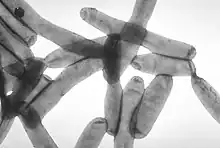legionella
See also: Legionella
English

Several legionellae (Legionella pneumophila)
Etymology
legion + -ella, from Latin legio. Constructed from "American Legion", after an outbreak of a then-unknown "mystery disease" (Legionnaires' disease) at a convention of the American Legion in Philadelphia in 1976.
Noun
legionella (countable and uncountable, plural legionellas or legionellae)
- Bacteria of the genus Legionella.
- 2021 September 8, “RMT strike threat over legionella on Thameslink trains”, in RAIL, number 939, page 18:
- Thameslink Train Services Director Rob Mullen responded: "A very low level of legionella was found during testing in a small number of our Class 700 train toilets. While it is extremely unlikely this would cause any harm, the toilets were immediately locked out of use. The trains were taken out of service and these toilets have now been drained, bleached and had their tanks completely re-filled. There is no recorded case of anyone, ever, having contracted legionella from a train."
References
 Legionella on Wikipedia.Wikipedia
Legionella on Wikipedia.Wikipedia  Legionella on Wikispecies.Wikispecies
Legionella on Wikispecies.Wikispecies  Legionella on Wikimedia Commons.Wikimedia Commons
Legionella on Wikimedia Commons.Wikimedia Commons - “legionella”, in Lexico, Dictionary.com; Oxford University Press, 2019–2022.
Dutch
Etymology
Borrowed from English legionella, from Legionella.
Pronunciation
- IPA(key): /ˌleː.ɣi.oːˈnɛ.laː/
Audio (file) - Hyphenation: le‧gi‧o‧nel‧la
- Rhymes: -ɛlaː
Noun
legionella f (plural legionella's)
- (countable, uncountable) legionella, bacterium of the genus Legionella.
- Synonym: legionairsbacterie
Related terms
See also
Italian
Related terms
This article is issued from Wiktionary. The text is licensed under Creative Commons - Attribution - Sharealike. Additional terms may apply for the media files.